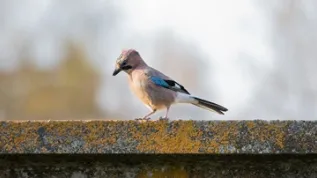
Mow less often - this is the simplest answer to the question whether urban lawns should be mowed or not. Subjective aesthetic reasons speak for mowing, everything else for not mowing, says Dr. Stanisław Czachorowski from the University of Warmia and Mazury.
Every year, from the beginning of spring, a public discussion begins about whether city and home lawns should be mowed or not. Supporters of mowing talk about aesthetics, minimizing the risk of tick bites, reducing the concentration of allergenic pollen; opponents - about the destruction of habitats of many species of invertebrates, biodiversity disturbance and destruction of places that naturally cool down the area, purify the air and retain water in the soil.
Dr. Czachorowski from the University of Warmia and Mazury’s Department of Ecology and Environmental Protection tells PAP that the point is not to stop mowing altogether, but to do it much less often. Above all, we should change the way of thinking about urban greenery and methods of its management.
'Short cut lawns are a fashion thing. It came to us like fashion for certain clothes, cars or diets. Unfortunately, this fashion is harmful and does not fit our reality,’ Dr. Czachorowski says. 'The discussion is indeed more and more intense, not only in Poland, but also around the world, but - unfortunately - substantive arguments are very weak in it.’
A BUDGET BURDEN
Trimmed lawns, prepared as if for playing golf, are very expensive to maintain. It is not only the cost of employing mowers, but also the costs of irrigation, fertilization and energy (electricity or gasoline).
So it is not profitable in any way, but it 'satisfies the human need for agency,’ says Dr. Czachorowski. ‘People need to feel that something is being done the way they want it; that reality is shaping up to their requirements. When the grass grows spontaneously between the traffic lanes and it is not mowed, it annoys us; we think something has been neglected. In addition, we say that it obscures visibility, etc. However, when tall ornamental grasses or even shrubs are deliberately planted in exactly the same place, we accept them, because it was an intentional procedure, dictated by man. The visibility argument does not exist at all anymore.
'It is like children who spend long hours doing homework. Maybe they do not do it well, maybe they have not learnt anything, but we have the feeling that they have studied, and that's the way it should be.’ He adds: ’It is this need for agency. Our human mentality is a huge barrier that is hard to overcome'.
A BURDEN FOR THE PLANET
Climate change is becoming more and more visible every year. Meanwhile, most parks and squares in Polish cities have been turned into concrete squares. 'Concrete, impervious surfaces in cities cause more and more problems,’ Czachorowski says. 'We are experiencing droughts and heat more and more severely. Slowly, everyone is starting to see what we have been talking about for years. If we want to cool our cities, we need to put more greenery back into them.’
Greenery, as the researcher explains, prevents overheating in various ways: it reflects the Sun's rays, increases the evaporation surface. 'In order to improve the quality of human life, it is necessary to free up as much space as possible; the soil should be bare and green wherever possible. This will cool the cities and reduce costs,’ Czachorowski continues.
Problems with drought and lack of water in cities are more and more frequent, and things will only get worse. 'During a drought, lawns that are mowed less frequently and naturally have a greater variety of plants cope much better. Although the grass withers, other species, such as yarrows, canopy plants and legumes, thrive. They are able to survive water shortages because they have longer root systems, Dr. Czachorowski says.
Secondly, he adds, the surface poor in greenery and uncovered soil is impermeable and any intense rain can cause flooding. Municipal sewage systems are not capable of draining all the water, hence more and more frequent reports of flooded streets, buildings and vehicles. ‘The more permeable surface we have, the more water could soak into the soil and the smaller the problem of flooding would be.
'Some people are surprised that we are talking about increasing droughts and increasing floods at the same time. But they are related. We have fewer rainy days in a year, but the rains are very intense, even stormy. With dried soil, a large one-time portion of water has no chance to soak in and floods the city instead. Which means that free, dense greenery is also important for water management,’ he says.
In addition, more absorbent soil replenishes deep water resources. 'It has come to the point that when surface water is scarce, we use deep water resources, e.g. for watering home lawns, washing cars. We use our most precious water for this. It must be emphasized, because sooner or later we will run out of it. Deep water is replenished slower than we consume it,’ Czachorowski warns.
When lawns are not mowed, more detritus, i.e. dead organic matter, is deposited in the soil, which acts as a sponge. Czachorowski says: 'We wouldn't have to build large retention reservoirs, which are not fully effective anyway, if we managed greenery more wisely.’
A HEALTH BURDEN
As global warming takes its toll on us and the number of hot days continues to increase, human mortality is also on the rise. 'Greenery is therefore not only a question of the quality of our life, but also its length. Investing in more lush vegetation in cities is a matter of our safety; it actually reduces mortality,’ the scientist says.
He adds that cities are an increasing part of the globe. Just a few decades ago the situation was completely different - they were only a small percentage of the whole, so what was happening in them was of little importance on the scale of the biosphere. Now there are a lot of urbanized areas, so the way we manage them is not only of local, but also global importance.
A BURDEN FOR BIODIVERSITY
According to Czachorowski, grass should be mowed once, maximum twice a year. Also, we need to let a variety of plants grow, not just a few select grass species.
He says: ‘If in one year tulips are planted on the city lawn, when they grow back in the next season mowers carefully avoid them, allowing them to live. But if anything other than what man has planted grows there, it is cut down without scruple, be it weeds or self-sown trees. If they have been planted in the same place by people, they are not questioned, if they grow spontaneously - they are unacceptable,’
Meanwhile, from the point of view of protecting biodiversity, it is worth allowing very diverse species to grow, even those that we call weeds.
'Due to the fact that in the countryside, i.e. agricultural areas, pesticides and other plant protection products are commonly used, wild species have practically no chance of growing there. In this situation, paradoxically, cities can become reservoirs of wild nature. The more so that the role of cities in the biosphere is constantly growing. We can protect biodiversity not only in national parks, but also in urban areas. And this is the purpose of rarely mowed lawns, which we can call flower meadows or - as I like to call them - herb meadows,’ Czachorowski says.
If the lawn is mowed often, some species of butterflies and other herbivores do not have a chance to develop, because they do not manage to complete their development cycle, having been deprived of food and shelter.
BASELESS ARGUMENTS
The most important argument raised by supporters of frequent and short mowing is aesthetics, but there is also the argument that taller grass means more ticks. 'Indeed, we could pour asphalt over everything and there would be no ticks, but this is similar to cutting off your hand when your finger hurts. The finger will certainly stop hurting, but does it make sense? Talking about combating ticks is a forceful rationalization. It is difficult for us to let go of a certain habit and we force ourselves to invent inadequate reasons, Czachorowski says.
There is also the argument of grass pollen. 'It also misses the mark,’ the researcher points out. 'There is much more pollen when mowing, so allergy sufferers have even more problems. To help them, we should ensure diversity, plant not only grass in cities. In addition, low mowing destroys the growth cones of plants, and grasses cope best with this. Other plants die, grasses do not, so there are more and more of them and their pollination is more severe.
'The losses include: deterioration of the quality of life, and even a threat to health and life due to the heat; direct costs related to the maintenance of lawns and indirect costs (e.g. expenses for air conditioning resulting from global warming); high consumption of water and energy, which we will run out of over time; flooding; depletion of water resources; a threat to biodiversity’.
'Gains: with tall grass, it's harder to pick up dog droppings, and that's about it. However, it is worth considering what is more important: the ease of cleaning up after pets or a more comfortable, healthier and longer life for residents,’ Czachorowski says. (PAP)
PAP - Science in Poland, Katarzyna Czechowicz
kap/ bar/ kap/
tr. RL













